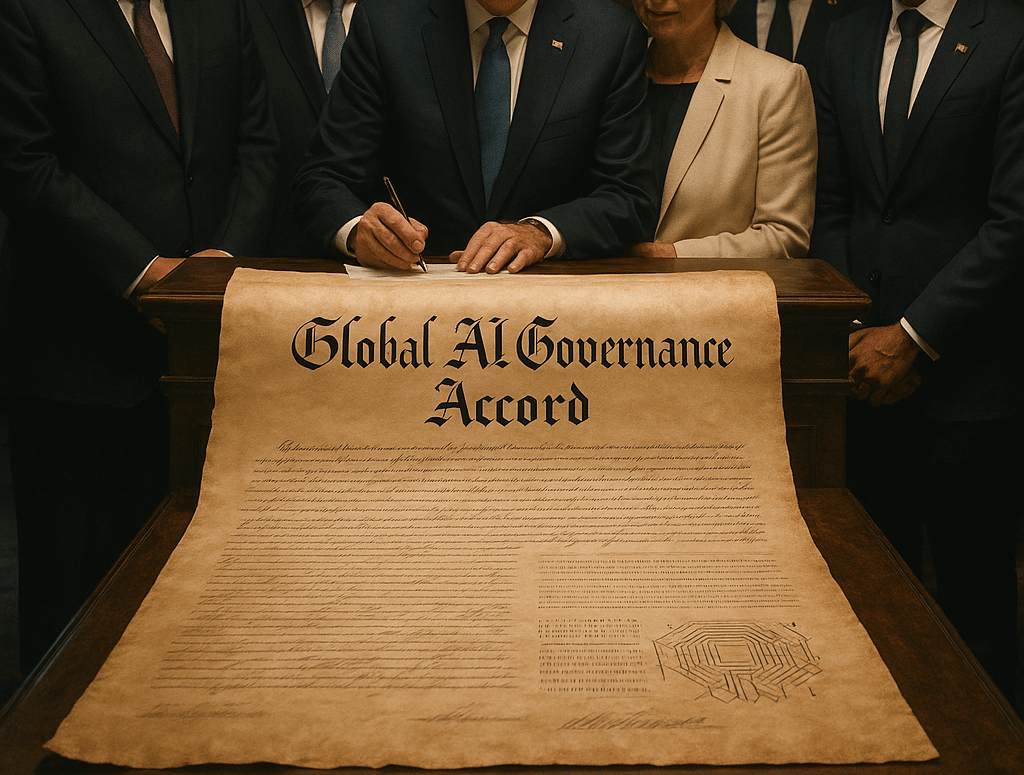China Proposes Global AI Rule Amid US Rivalry
China proposes a global AI governance framework amidst US-China trade tensions, emphasizing international coordination to prevent monopolies, promote human welfare, and ensure AI benefits social progress.
ARTIFICIAL INTELLIGENCETECHNOLOGY
Eric Sanders
7/29/20254 min read


China’s Bold Play for AI Governance: Game Changer or Another Power Move?
One thing is becoming crystal clear in the conversation of AI governance: No country can, or should, go it alone. China’s recent proposal for a global AI governance framework can be seen as China taking the lead on what it means to protect people and way AI is used and consumed. It’s a bold statement of intent in a high-stakes arena where innovation, ethics, and geopolitics constantly collides. Tensions between the U.S. and China continue to simmer over trade and technology, Beijing is seen stepping up to the global stage, advocating for cooperation that touches the core of how AI will shape humanity’s future.
Should We Care About China’s Call for AI Governance?
At first glance, China’s push may seem self-serving, after all, the country wants to protect its growing AI industry and assert influence over global norms. Digging deeper revealed a more complex picture for me though. The proposal insists on “international coordination to prevent monopolies, promote human welfare, and ensure AI benefits social progress.” Kind of sounds like a good idea I think. It’s a vision that challenges the chaotic, fragmented approach to AI regulation currently prevalent.
Consider the following:
- Preventing monopolies: With the dominance of a handful of tech giants, particularly from the U.S., AI development risks becoming concentrated in the hands of a few powerful corporations. This not only stifles innovation but creates vulnerabilities, economic, ethical, and political, that affect the global community.
- Promoting human welfare: AI isn’t just about algorithms and data centers. Its impacts will ripple through healthcare, education, labor markets, and even human rights. Ensuring that AI serves humanity, not profits or power, requires a common understanding and shared rules.
- Ensuring AI benefits social progress: Technology should uplift societies broadly, addressing inequalities rather than exacerbating them. This ideal pushes for governance that goes beyond national interests toward inclusive growth and sustainability.
My Take on the Governance
Working in the tech industry during these transformative years I’ve witnessed how the “wild west” mentality of AI development has bred both incredible breakthroughs and dangerous blind spots. Companies chase competitive advantage at lightning speed, often sidestepping ethical questions or longer-term consequences. Governments, meanwhile, scramble to keep pace with regulations that are either too weak or too fragmented.
When I saw China’s proposal emerge from the World Artificial Intelligence Conference, I found myself torn. Skeptical, yes. After all, geopolitical rivalry colors every global conversation between Beijing and Washington. But I was also cautiously hopeful. Could this herald a genuine pivot toward collaboration, even if born from competition? The idea that AI governance needs global stewardship isn’t some new idea, but seeing one of the world’s biggest players formally articulate mattered to me.
The ongoing U.S.-China trade tensions have already fractured supply chains, throttled innovation pipelines, and created an atmosphere of mistrust. The next battleground could very well be AI itself: who gets to set the rules, who holds the data, and who reaps the rewards. China’s move seems to acknowledge that without cooperation, both nations, and the rest of the world, stand to lose.
Future of AI Governance
China’s proposal offers a snapshot of international politics; it showcases something vital about the future of technology governance:
- Global problems require global solutions. AI isn’t confined by borders. If the technologies are developed without common standards, it can lead to dangerous inequalities or misuse. Coordinated global governance can help mitigate these risks by establishing agreed ethical frameworks and technical interoperability.
- No one nation has all the answers. While China emphasizes its vision of governance, and the U.S. often pushes for market-led approaches, the truth is that a patchwork approach invites conflict and fragmentation. Dialogue and shared principles are essential.
- Technology must serve people, not power blocs. The proposal’s emphasis on human welfare and social progress reminds us of the foundational reason technology should exist.
Key features of China’s framework proposal include:
- Enhanced transparency in AI development
- Collaborative data sharing with privacy safeguards
- Equitable access to AI technologies across countries
- Anti-monopoly measures to promote fair competition
Could This Be the Turning Point for AI?
We’re at a crossroads people. Will AI governance emerge as a tool to deepen global divisions or unify us around common values and rights? While skepticism toward China’s intentions is understandable, dismissing the call outright risks missing the window to build inclusive, effective frameworks.
AI continues with its rapid advancements, reshaping industries, labor, and even the nature of creativity, waiting for a perfect alignment is a luxury the world does not have. my lingering question isn’t whether competition will continue, but how cooperation could shape that race for the better.
Who will step up to lead this charge alongside China? Will the U.S. engage genuinely beyond rhetoric? How can smaller nations influence these frameworks to ensure AI benefits everyone, not just powerful states? The answers to these questions will determine whether AI becomes a tool for progress or another vector of global conflict.
When you think about the vast implications of AI and the tentative steps being taken toward governance, ask yourself (as I did) the following: How can we, as individuals and societies, contribute to shaping AI’s future so that innovation empowers rather than divides?
And perhaps, what role will your country or community play in the story of AI governance that’s just beginning to be written?
Efficiency
Transform your workflows and reclaim your time.
Contact Us
Need A Custom Solutions? Lets connect!
eric.sanders@thedigiadvantagepro.com
772-228-1085
© 2025. All rights reserved.
